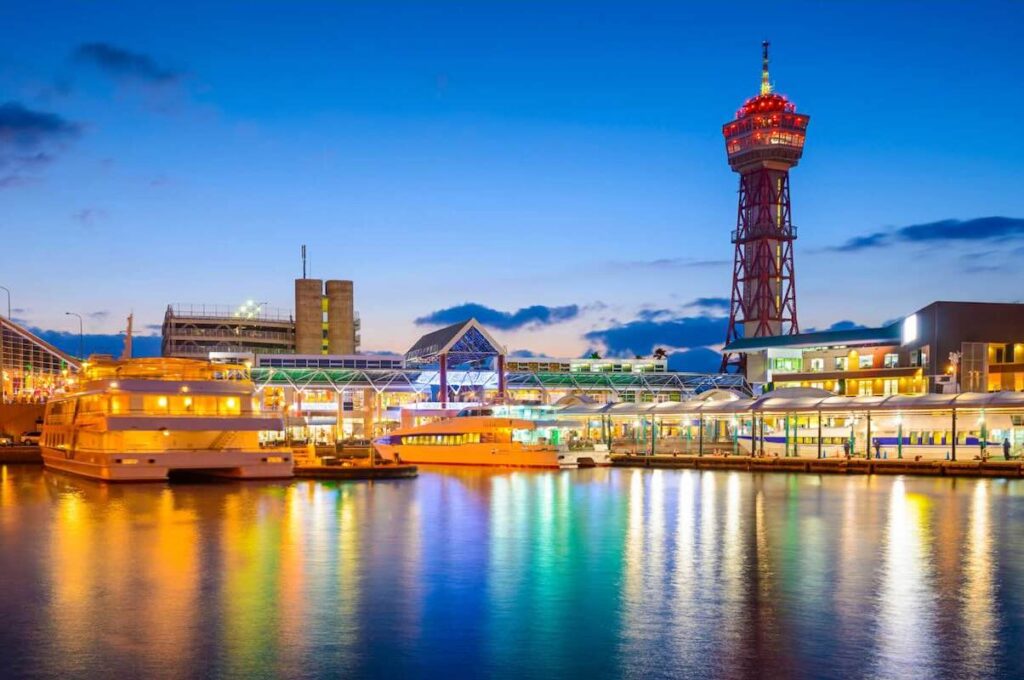Fukuoka is a great place to invest in real estate – for Japanese and non-Japanese alike. Buying and investing in real estate in Fukuoka is both a smart lifestyle choice and a smart investment. Let us guide you through it.
Fukuoka, known for its vibrant culture, rich history, and strategic location, offers a unique blend of urban convenience and natural beauty, making it an excellent place for living or investing. If you can’t live there (we hope you can), then others definitely want to and will live there.
Fukuoka’s property market is experiencing robust growth, with real estate prices expected to rise in 2025. The city’s resale condominium prices have risen, particularly in central areas like Chuo Ward, up 25.7% year-on-year. This trend is driven by Fukuoka’s growing population, economic development, and strategic location as a gateway to Asia. The city’s land prices have also seen considerable increases, with Fukuoka leading all prefectures in Japan with a 5.7% year-on-year increase across various land use categories. These factors contribute to a dynamic and attractive real estate market in Fukuoka.
Japan’s most livable and well-balanced city, with a great climate and few earthquakes
Fukuoka is often celebrated as one of Japan’s most livable cities, and for good reason. It’s got that perfect balance of urban excitement and laid-back vibes that many people crave. For instance, the city boasts a vibrant food scene, with famous dishes like tonkotsu (pork bone) ramen and mentaiko (spicy cod roe) that attract food lovers from all over the world.
The weather’s agreeable, too, with mild winters that rarely see snow and summers that definitely heat up, but are offset by ocean winds and cleaner air, averaging around 30°C (86°F) during the hottest months. This makes Fukuoka a terrific place for outdoor activities, like jogging around Ohori Park, a vast lake-centered park in the city limits. Also, Fukuoka doesn’t get hit by earthquakes as much as other parts of Japan.
According to a report by the Japan National Tourism Organization, Fukuoka has consistently ranked high in terms of safety and quality of life, making it an attractive destination for both locals and expatriates alike.
Fukuoka’s economic growth and rising popularity among expats
The city’s economy is on the up and up, making it a hot spot for both business and leisure. In recent years, Fukuoka has seen a considerable GDP increase, with sectors such as technology and tourism leading the charge. For instance, the Fukuoka Growth Next initiative has fostered numerous startups, attracting entrepreneurs from around the globe. This surge in economic activity has’nt only created jobs and further raised the overall quality of life in the city.

With more and more expats calling it home, Fukuoka is buzzing with international energy. The city has become a melting pot of cultures, with a vibrant community of foreign residents contributing to its dynamic atmosphere. Events like the Fukuoka International Film Festival and the Hakata Gion Yamakasa Festival showcase this cultural diversity, drawing participants and audiences from various backgrounds.
This mix of economic growth and cultural diversity makes it a prime location for Japan real estate investment, offering plenty of opportunities for those looking to buy property. The real estate market in Fukuoka has been on a steady rise, with properties in areas like Tenjin and Hakata seeing significant appreciation in value.
Investors are particularly drawn to the city’s affordable housing options compared to Tokyo and Osaka, as well as the potential for rental income from the growing expat population. Additionally, government incentives for foreign investors further enhance the appeal, making Fukuoka a strategic choice for those looking to capitalize on Japan’s real estate market.
Lower property costs than Tokyo (Kanto) or Osaka (Kansai)
One of the biggest draws? The price tag. When you compare the cost of real estate in Fukuoka to that of major cities like Tokyo or Osaka, the difference is striking.
While a modest two-bedroom apartment in Tokyo can easily set you back over 50 million yen, similar properties in Fukuoka can be found for around 30 million yen or less. And that’s to live in a smaller, more easy-going city with a milder climate and less threat of massive earthquakes.
This considerable price difference means that buyers can enjoy a higher quality of life without breaking the bank. You get more bang for your buck, whether you’re buying a cozy apartment or a spacious house. For example, a spacious three-bedroom house in Fukuoka might cost you around 40 million yen, whereas the same property in Osaka could easily exceed 70 million yen.
While a one-bedroom apartment in Tokyo’s city center averages ¥170,952 per month, a similar property in Fukuoka costs about ¥73,333. This price difference extends to property purchases, with the cost per square meter to buy an apartment in Fukuoka’s city center at ¥785,000, vs. Tokyo’s ¥1,619,911.
Strong transportation and urban development initiatives
Getting around Fukuoka is a breeze, thanks to its highly efficient and well-organized transportation system. The city boasts an extensive network of buses, subways, and trains that connect various neighborhoods and attractions seamlessly. For instance, the Fukuoka City Subway has two main lines, the Kuko Line and the Hakozaki Line, which provide easy access to popular destinations such as Tenjin, Hakata, and the Fukuoka Tower. And the massive bus network easily files in gaps in the relatively modest (by Japanese standards) train and subway system. Or simply hail a cab or use an app to do the same.
This network makes commuting not only convenient but also enjoyable, as you can take in the sights of the city while traveling.
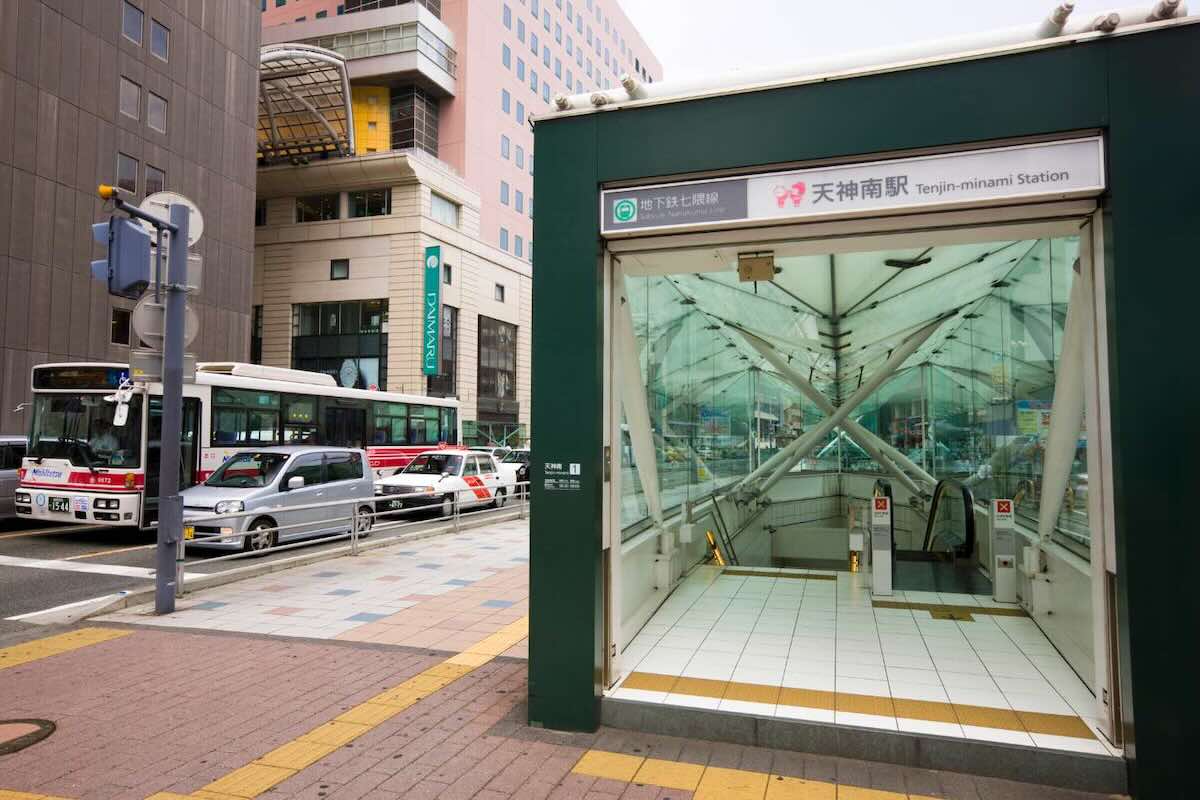
The public transportation system is complemented by a variety of options for those who prefer to explore on foot or by bike. Fukuoka’s known for its pedestrian-friendly streets and numerous bike rental services, such as the Fukuoka “Chari-chan” bicycle-sharing program, which allows residents and visitors to easily navigate the city at their own pace. This combination of efficient public transport and walkable areas encourages a vibrant urban lifestyle, making it an ideal place for both locals and tourists to enjoy.
In addition to the existing infrastructure, there are ongoing urban development projects that are set to enhance Fukuoka’s appeal even further in the coming years. For example, the Fukuoka City Development Plan aims to improve public spaces, increase green areas, and expand transportation options, including the introduction of new tram lines and bus routes. These initiatives not only aim to accommodate the growing population but also to promote sustainable urban living, ensuring that Fukuoka remains a dynamic and attractive city for generations to come.
High rental demand driven by students, professionals, and young families
There’s a constant and robust demand for rentals in Fukuoka, a vibrant city that boasts several universities, a thriving job market, and numerous family-friendly neighborhoods. This demand is fueled by a diverse population that includes students seeking accommodations during their studies, professionals relocating for work opportunities, and young families looking to settle down in a nurturing environment.
The rental market in Fukuoka is definitely on the up, making it an attractive option for investors. Fukuoka continues to buck the trends in Japanese cities not called Tokyo. Population and prices are rising, but not unreasonably so.
According to a report by the Japan Real Estate Institute, the rental market in Fukuoka has shown consistent growth over the years, driven by the influx of new residents and the city’s appealing lifestyle. This trend indicates that investing in properties with good rental potential in Fukuoka is a smart move and a strategic one, as the city continues to develop and attract more people.
The real estate market in Fukuoka
Recent market trends and average property prices
Fukuoka’s property market is gaining traction among investors and homebuyers, offering a compelling alternative to Tokyo’s pricier real estate. In urban Fukuoka, commercial land prices rose by 12.6% and residential prices by 9.6%. This growth outpaces the national average, reflecting Fukuoka’s appeal as a vibrant urban center. Yet, it doesn’t mean Fukuoka isn’t still a bargain.
Fukuoka’s real estate market is expected to continue its upward trajectory, with experts predicting annual increases of 1% to 3% in 2025. And with low interest rates and ongoing gradual inflation even out buying ambitions, its properties are especially attractive for overseas buyers, whether as a residence or an investment.
Property types: condos/apartments, detached homes, buildings
In Fukuoka, the real estate market offers the typical range of properties you’ll find in a city of any size and with a diverse range of ages and household compositions.
Condominiums are individually owned units within a larger building, providing shared amenities and maintenance services, making them a popular choice for urban dwellers seeking convenience and community.
Apartments, on the other hand, are typically rented units within a building, appealing to those who prefer flexibility and lower commitment, often attracting young professionals. Detached homes, which stand alone on their own plots of land, provide more space and privacy, suitable for families or individuals desiring a yard for outdoor activities.
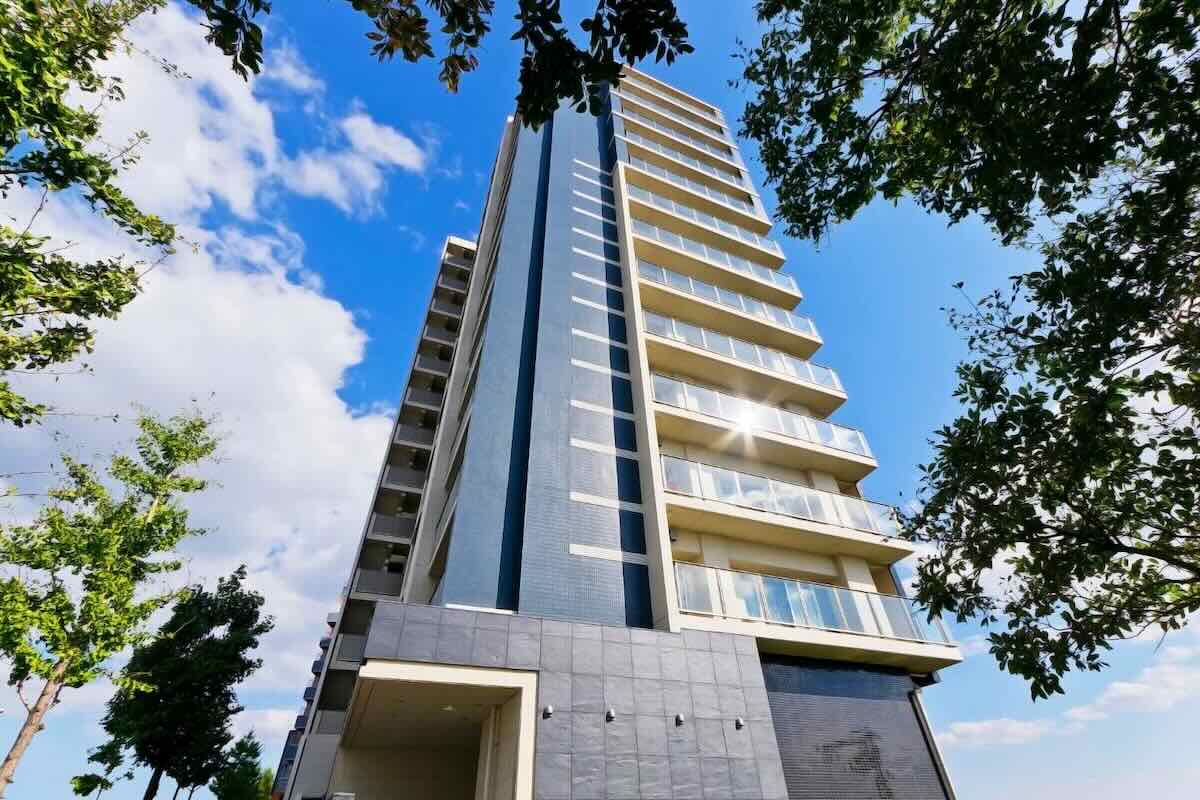
Both condos and apartments are commonly referred to as “mansions” (マンション), though the term is more likely to apply to something more recent (i.e., built from the 1990s onward) and with relatively up-to-date amenities all the way to ultra-modern and automated places.
As a larger and higher-yielding investment, entire buildings can be purchased, offering opportunities for rental income or development. If they are already solidly occupied, full buildings can cater to those looking for larger-scale investments in the real estate market. In Japan, a building can be anywhere from a few units to a massive complex, so you don’t have to be a mega-investor to get your foot in the door.
Key factors influencing property values
Numerous factors can significantly influence property values in Fukuoka, a city that has seen considerable growth and transformation in recent years. One of the most critical elements is location; properties near to essential transport links, reputable educational institutions, and vibrant shopping districts like Tenjin, Hakata, and further out around the Yahoo! stadium and Momochi tend to command higher prices.
The overall condition of the property, including any recent renovations or upgrades, also plays a vital role in determining its market value. Fukuoka’s ongoing urban development initiatives have led to a resurgence in interest in areas that were previously considered less desirable, resulting in increased demand and, consequently, higher property values in those neighborhoods.
Rental potential
If you’re considering renting out your property, the city boasts a robust demand for rental properties, driven by a diverse demographic that includes students from prestigious institutions such as the elite public Kyushu University, with its strong research programs and vibrant campus life, and private Fukuoka University, known for its strong emphasis on international education and community engagement.
The influx of professionals attracted by Fukuoka’s burgeoning business scene, particularly in sectors like technology and healthcare, further fuels this demand. Families are drawn to the area because of its excellent educational facilities and family-friendly neighborhoods, such as Nishijin and Ohashi, which offer a blend of urban convenience and suburban tranquility.
With the continuous growth of the local economy and the increasing number of expatriates and domestic migrants, there’s always a steady stream of individuals seeking a place to call home.
Best Fukuoka neighborhoods for buyers and investors
When you’re looking into the best neighborhoods in Fukuoka for real estate, the Tenjin/Daimyo area is the uncontested hub in compact Fukuoka. This vibrant district is home to the Tenjin Big Bang development project, which is transforming the landscape with modern office spaces, trendy shops, and a variety of dining options.
Key attractions include the Tenjin Underground Shopping Mall and the nearby Nishitetsu Fukuoka (Tenjin) Station, making it easily accessible. The area buzzes with cafes and lively nightlife, particularly around the Daimyo district, known for its unique boutiques and bars. It’s like the beating heart of the city.
If you’re into a mix of business and pleasure, this is your spot. Its vibe clicks with young professionals and creatives, and with singles and small families.
Hakata: Transportation and shopping
Hakata is the gateway to Fukuoka, thanks to its major train station, Hakata Station, which serves as a hub for the Shinkansen bullet trains and the Kagoshima Main Line.
Nearby Fukuoka International Airport also makes it incredibly convenient for travelers, whether you’re always on the move or love shopping. The airport, smack in the middle of a mostly residential and commercial area, is just a 5-minute subway ride from Hakata.
The Hakata area considers to be upgraded and expanded. JR Hakata City, above and around the train station, is packed with trendy, modern stores. And the attractive and creative indoor/outdoor Canal City Hakata is just a 10-minute walk up the road. There are also local markets where you can find fresh seafood and local delicacies.

Traditional attractions like the Kushida Shrine and Hakata Machiya Folk Museum are also nearby. Yes, there’s a bit of a lack of greenery, but in Fukuoka, no matter where you live, you’re never far from mountains or ocean, with rivers and canals running through the city. Indeed, the Hakata and Tenjin sides are divided by a pleasant Naka (“middle”) River.
Coast – Momochi, Itoshima: Beach life with an easy commute
Imagine waking up to calm ocean views in the picturesque neighborhoods of Momochi and Itoshima, both of which are conveniently located just a short subway/train ride or drive from the city center of Fukuoka.
These coastal areas not only provide stunning vistas but also a relaxed lifestyle characterized by pristine beaches, lush parks, and a vibrant community atmosphere.
The local beaches, such as Momochi Seaside Park, offer a variety of recreational activities, including swimming, sunbathing, and beach volleyball, while the nearby Itoshima area is known for its scenic hiking trails and charming cafes that serve locally sourced food. Commuting to the city is incredibly convenient, with frequent public transport options available, including the Nishitetsu train line and bus services that connect these neighborhoods to Fukuoka’s urban core in under 30 minutes.
This easy access allows residents to enjoy the tranquility of coastal living while still being able to partake in the vibrant city life, cultural events, and employment opportunities that Fukuoka has to offer. Momochi and Itoshima have a charming balance of serene coastal living and urban convenience, making them highly sought-after locations for those looking to enjoy the best of both worlds.
Foothills and mountains: Living in nature, close to the city
If you’re someone who loves the outdoors but doesn’t want to be too far from the vibrant city buzz of Fukuoka, the nearby foothills and mountains, particularly the Sefuri Mountains and the Chikuhō region, are great destinations. These areas are easily accessible via public transport, with regular bus services from the city center to the trailheads, making it convenient for day trips.
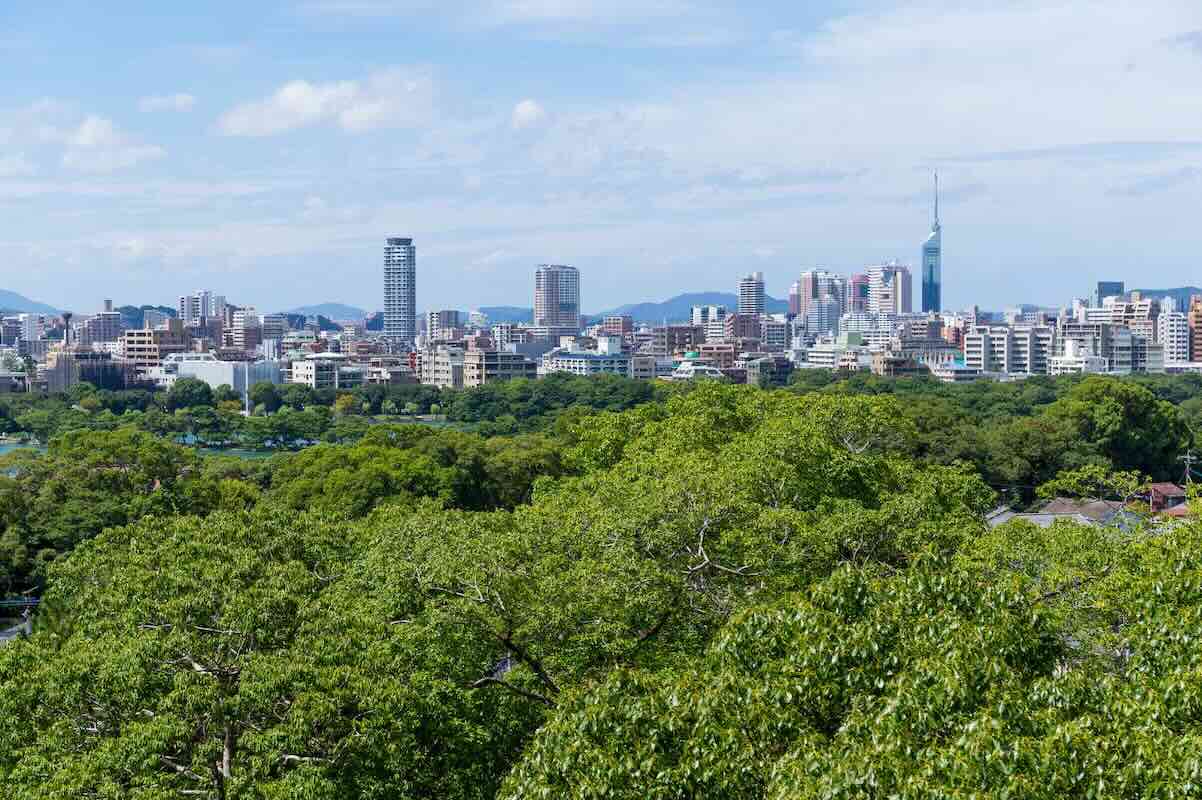
You can enjoy a variety of hiking trails, such as the popular Sefuri Trail, with panoramic views of Fukuoka City and the surrounding landscape. The trails are well-marked and cater to different skill levels, ensuring that both novice hikers and seasoned adventurers can find suitable paths. The lush greenery and diverse wildlife in these mountainous areas provide a peaceful escape from the urban hustle and bustle.
After a day of hiking, you can return to the city within a short drive, bus, or train ride.
Legal and financial considerations for foreign buyers
Property ownership rules for non-Japanese residents
When it comes to purchasing real estate (不動産, fudōsan, which is why we’re called Yes! Fudousan) in Japan, the process is relatively straightforward and accessible. Foreign nationals have the legal right to own land (土地, tochi) and buildings (建物, tatemono) in the same manner as Japanese. This means that regardless of your nationality, you can engage in property transactions without facing additional restrictions. Importantly, there is no requirement for residency status (居住権, kyojuken) or specific visa types to influence your ability to acquire property. You will enjoy the same property rights (所有権, shoyūken) as local residents, which is indeed a significant advantage.
However, owning property in Japan doesn’t automatically confer any immigration benefits, such as a visa or residency status. So, while you can purchase a house, it doesn’t guarantee that you will be able to reside in Japan on a long-term basis without navigating the standard immigration procedures. Therefore, prospective buyers should be well-informed about the legal and bureaucratic landscape surrounding property ownership and immigration in Japan.
Financing options and loan eligibility
Now, let’s talk about financial matters if you’re buying property in Japan.
Acquiring a loan in Japan as a foreigner can present certain challenges. Most financial institutions require a stable financial history, which typically includes proof of income and employment stability. Having a long-term work visa or permanent residency greatly improves your chances of securing a loan, but some expatriates find it more straightforward to obtain financing from banks in their home country, where they may have established credit histories.
It’s definitely not impossible to obtain a loan from a Japanese bank, but it’s essential to prepare thoroughly and it’s best to consult with a financial advisor who understands the nuances of the Japanese banking system. However, we’re happy to guide you because we’ve been through this a lot. We can let you know what you’ll need so get in touch and tell us your situation.
And when budgeting for your dream home, it’s vital to account for additional costs.
Taxes and additional costs to consider
When discussing the financial aspects of acquiring real estate in Japan, it is essential to recognize that the purchase price is just one part of the overall cost. In addition to the sale price, prospective buyers must account for various taxes and fees that can significantly impact the total expenditure. These expenses typically encompass registration and license tax, which is levied on the transfer of property ownership, as well as brokerage commissions that we real estate agents charge for their services.
Buyers should also consider additional costs such as judicial scrivener fees for the preparation of necessary legal documents, and property acquisition tax, charged on the purchase of real estate. Generally, it’s advisable to allocate an extra 6-8% of the property’s purchase price to cover these supplementary expenses, ensuring that you have a comprehensive understanding of the financial commitment involved.
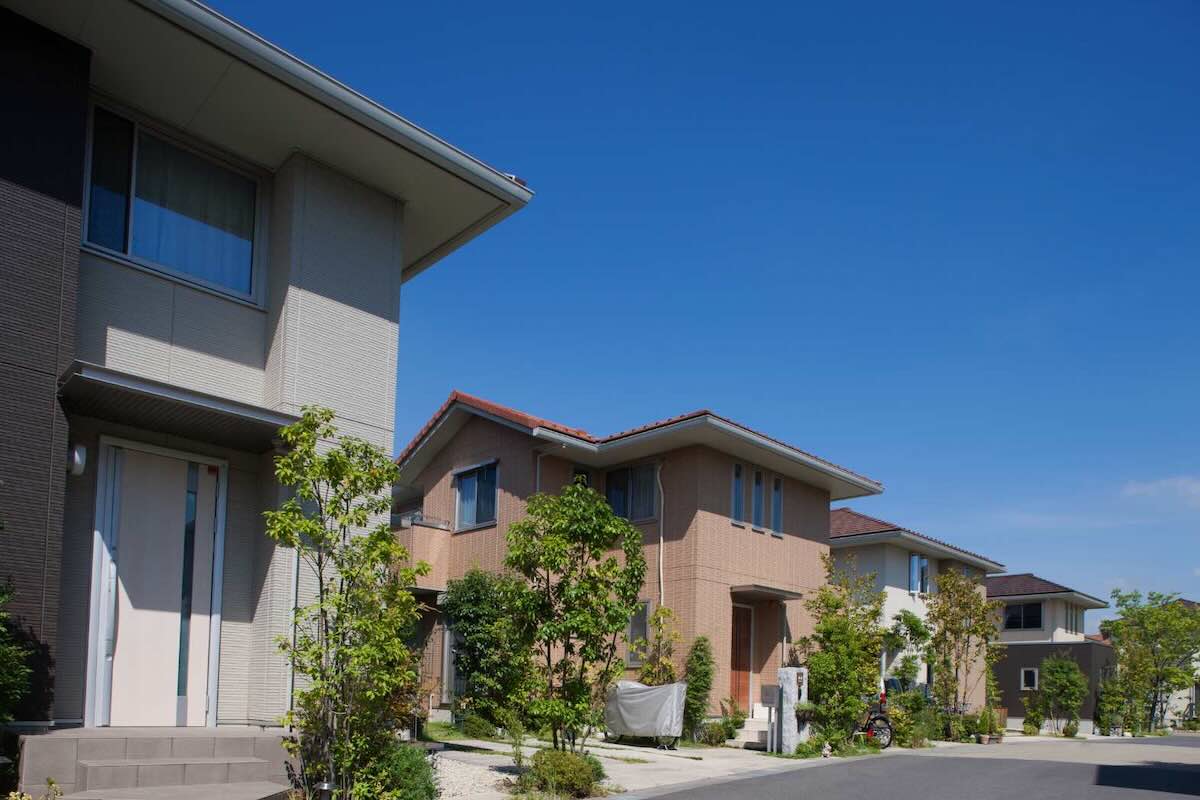
It’s vital to incorporate these costs into your overall budget to prevent any unexpected financial burdens in the future. Notably, Japanese property laws stipulate that foreign buyers are subject to the same tax obligations as Japanese citizens, thereby placing them on equal footing in terms of taxation. Therefore, it is imperative to ensure that your financial arrangements are thoroughly organized and prepared before embarking on the property acquisition process.
Successful property investment in Fukuoka
Knowing the lay of the land is crucial when investing in Japan property. Literally, because the land itself can be related to natural or manmade factors like landslides and train tracks. Start by digging into the local market trends and Fukuoka property prices. Chat with people who live there to get the inside scoop. They can tell you things stats and reports miss.
Working with local real estate agents and legal professionals (we can help)
Local real estate agents and legal pros are your best friends when buying a house in Fukuoka, and they’re essential, because of the administration and quite strict laws.
They’ll guide you through the maze of paperwork and legal matters. And if you’re not in Fukuoka, no worries. Some agents even handle things remotely. They can help you find the right spot, whether you’re looking for a cozy condo or a sprawling house.
We are local, family-owned, and always have your best interests at heart. Check our buying page to learn more.
Rental potential and getting ROI
Fukuoka’s rental market is thriving, particularly in areas such as Hakata and Tenjin, which are popular among students, young families, and professionals. The city has a vibrant population of over 1.5 million, with a significant number of universities, including Kyushu University, contributing to a steady influx of students seeking rental accommodations. In terms of industries, Fukuoka is becoming a hub for technology and startup companies, which is attracting young professionals looking for housing.
Rental rates in these sought-after districts range from ¥60,000 to ¥120,000 per month for one-bedroom apartments, depending on proximity to public transport and amenities. The demand for rental properties is high, particularly for units that are well-located and offer modern conveniences.
Focusing on areas with high rental demand, such as near the Fukuoka Tower or Canal City shopping complex, can lead to solid returns on investment. It’s essential to conduct thorough market research and stay informed about trends, as making informed choices will improve your chances of achieving a decent ROI.
Keeping an eye on emerging neighborhoods and understanding the local market dynamics will be key to your success in this vibrant rental landscape.
Yes! Fudousan is your English-speaking real estate partner in Fukuoka
Full English support from a family-run business
Buying property in Japan can feel a bit like diving into a sea of paperwork and rules, especially if you’re not a local. But that’s where Yes! Fudousan comes in. We’re a family-run business that speaks your language—literally. With full English support, we make the whole process closer to working on a project with a friend rather than a legal marathon.
We’ll walk you through every step, making sure you understand everything. We hope to be your new best friends in Fukuoka.
Arrange viewings and paperwork even if you’re not in Fukuoka
If you can’t be in Fukuoka to check out properties, we can still start your search, share options with you, and set things up so you’ll be able to move quickly when you get here. And when you’re closing the deal, we can mail documents as necessary.
We’re here to help you find your dream home or investment property in Fukuoka. With our expert guidance, you can navigate the buying process with ease.
Don’t wait any longer to start on your path to owning a piece of Fukuoka in which you can live or invest. We’re waiting to hear from you.

